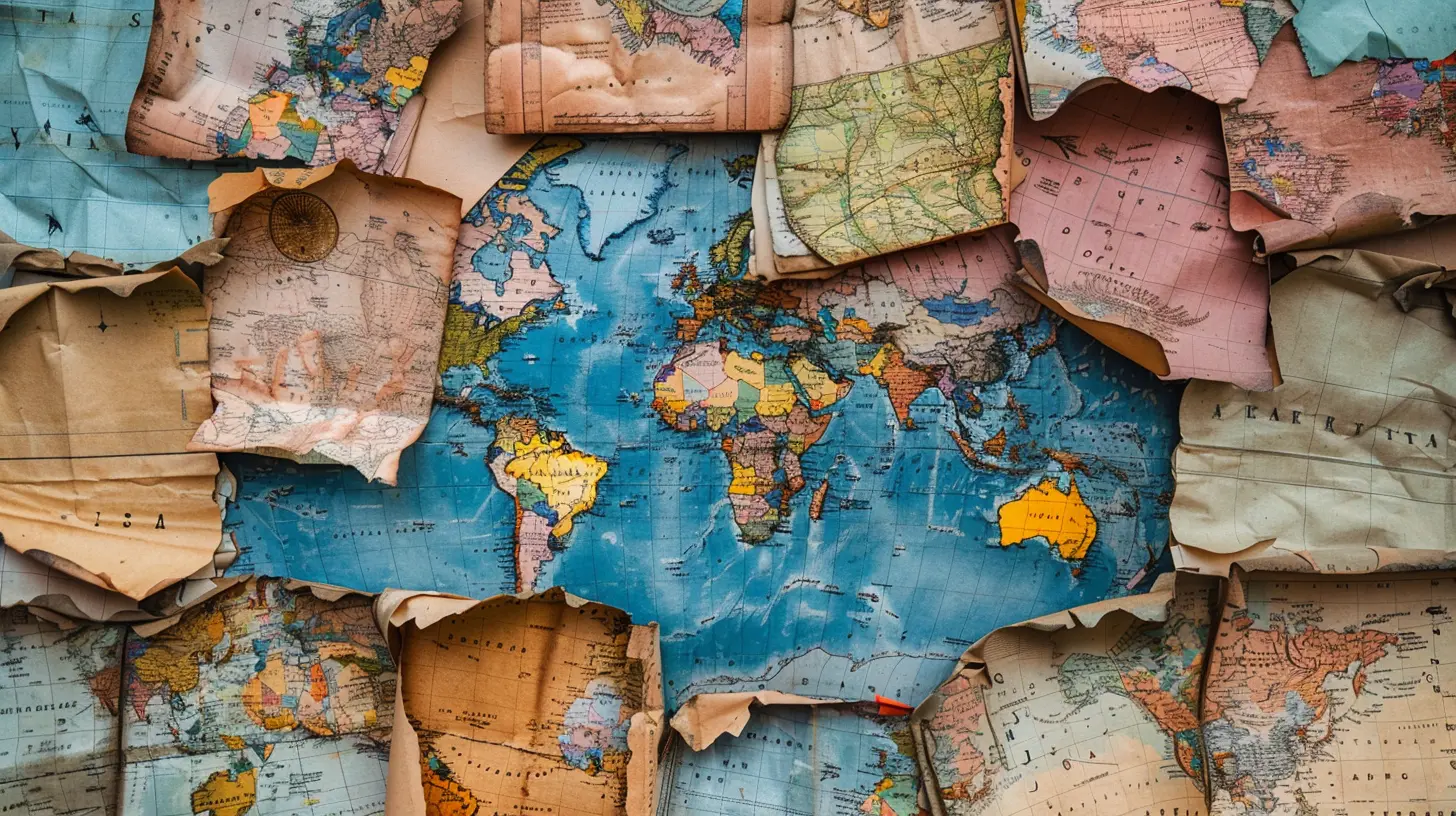Stress-Free Travel: Tips for Organizing Your Documents
24 May 2025
Traveling is an exciting adventure, but let's be honest—it can also be stressful. From booking flights to finding accommodations, there's a lot to juggle. And one thing that can make or break your trip? Your travel documents.
Imagine arriving at the airport, only to realize your passport is missing. Or worse, finding out your visa isn’t valid. Nightmare, right? That’s why organizing your travel documents is just as important as packing your suitcase.
In this guide, we'll go over practical, no-nonsense tips to keep your travel documents organized, secure, and easy to access. Let's make your next trip smooth and stress-free! 
Why Organizing Travel Documents Matters
You might think, “I’ll just shove my passport in my bag, and I’m good to go.” But trust me, having a solid system in place can save you from last-minute panic attacks.Avoid Travel Hassles
Misplacing essential documents can lead to delays, missed flights, or even denied entry. Proper organization ensures a seamless travel experience.Save Time and Energy
Nothing is worse than digging through your bag at airport security while people behind you sigh impatiently. Having everything in one place lets you breeze through checkpoints.Stay Prepared for Emergencies
Lost passport? Stolen wallet? Having copies of your documents makes it easier to get replacements quickly.
Essential Travel Documents You Need
Before we get into how to organize them, let’s cover the must-have travel documents you shouldn't leave home without:📌 Primary Documents
- Passport – Your golden ticket for international travel. Check the expiration date well in advance.- Visa (if required) – Some countries require a visa before arrival, so double-check the requirements.
- Driver’s License/ID – Useful for domestic travel and identity verification.
📌 Travel & Booking Documents
- Flight Tickets & Boarding Passes – Whether printed or digital, make sure they’re easily accessible.- Hotel Reservations – A confirmation email or printed copy can be helpful if there’s a mix-up.
- Car Rental Confirmation – If renting a car, keep a copy of the reservation details.
📌 Health & Safety Documents
- Travel Insurance – A must for peace of mind in case of medical emergencies or trip cancellations.- Vaccination Records – Some countries require proof of vaccinations, like the Yellow Fever card or COVID-19 certificate.
📌 Financial Documents
- Credit/Debit Cards – Carry at least two cards in case one doesn’t work.- Emergency Cash – Always have some local currency for places that don’t accept cards.
- Bank Contact Information – In case you need to report a lost card.
📌 Backup Copies
- Photocopies of Important Documents – A copy of your passport, visa, and travel insurance can be a lifesaver.- Digital Copies Saved Online – Store scanned copies in cloud storage like Google Drive or Dropbox.

Best Ways to Organize Your Travel Documents
Now that we know what to bring, let’s talk about how to keep everything organized so you can focus on enjoying your trip.1. Use a Travel Document Organizer
A travel document organizer (or wallet) is a simple yet effective way to store everything in one place. Look for one with multiple compartments for passports, boarding passes, and credit cards.> Pro Tip: Choose an RFID-blocking organizer to protect your cards from electronic theft.
2. Keep a Digital Backup
In today’s digital world, having electronic copies of your documents is a must. Scan or take high-quality photos and store them securely in:- Cloud storage (Google Drive, Dropbox, OneDrive)
- Your email (send them to yourself)
- A secure travel app like TripIt or Evernote
3. Keep Emergency Copies Separate
It’s always a good idea to have printed copies of your passport, visa, and travel insurance stored separately from the originals. Keep these in a different bag or with a travel companion.4. Organize Documents by Category
Sort your documents into easy-to-access categories. For example:- Essentials Folder (passport, visa, ID)
- Travel Plans Folder (flight tickets, hotel confirmations)
- Medical & Insurance Folder (insurance details, vaccination records)
- Financial Folder (credit cards, emergency cash, bank contacts)
This way, you'll always know where everything is.
5. Use Zippered Pouches for Extra Protection
A simple zippered pouch can help keep small documents safe from spills, dirt, or accidental rips. Waterproof pouches work best if you're traveling to places with unpredictable weather.6. Carry A Small Notebook
You never know when your phone might die or when you can’t access the internet. Jot down important details like:- Hotel addresses
- Emergency contacts
- Embassy details
- Flight information
7. Memorize or Note Down Important Numbers
In case of an emergency, it helps to know key phone numbers by heart or have them recorded in a physical notebook. Make sure to note down:- Your country’s embassy contact in the destination country
- Local emergency numbers
- Family or friend’s contact for backup 
How to Keep Your Documents Safe While Traveling
Staying organized is great, but keeping your documents safe is just as important. Here’s how to avoid theft or loss:1. Use a Money Belt or Hidden Pouch
Wearing a money belt under your clothes keeps important documents close to you while preventing pickpocketing.2. Don't Keep Everything in One Place
Spread your important documents between different bags or with trusted travel companions. That way, if you lose one bag, you don’t lose everything.3. Be Mindful in Crowded Areas
Tourist-heavy places attract pickpockets. Keep your bag zipped and in front of you, especially in busy markets or public transport.4. Use Hotel Safes
If your hotel provides an in-room safe, use it to store passports, extra cash, and backup credit cards when you don’t need them.What to Do If You Lose Your Travel Documents
Even with the best organization, things can go wrong. If you lose an important document, here’s what to do:Lost Passport?
- Report it immediately to the nearest embassy or consulate.- Show a photocopy if you have one to speed up the replacement process.
Lost Credit/Debit Card?
- Call your bank to report the loss and freeze the card.- Use any backup cards or emergency cash until you get a replacement.
Lost Travel Insurance?
- Contact your insurance provider—they can resend you the details via email.Final Thoughts
Traveling should be about making memories, not stressing over misplaced documents. By taking a little time to organize your travel documents properly, you can avoid unnecessary headaches and focus on what truly matters—enjoying your trip!Next time you pack your bags, remember these simple tips. Trust me, your future self will thank you.
all images in this post were generated using AI tools
Category:
Travel HacksAuthor:

Taylor McDowell
Discussion
rate this article
4 comments
Georgina Oliver
Organizing documents? Think of it like packing a suitcase—don’t forget the travel snacks! Priorities, right?
June 18, 2025 at 4:55 AM

Taylor McDowell
Great analogy! Just like packing, organizing documents is all about prioritizing essentials for a smooth journey. Happy travels!
Starla McNaughton
Great tips! Organizing travel documents can really ease pre-trip anxiety. Your suggestions highlight the importance of preparation, making the journey more enjoyable and stress-free. It’s all about creating those memorable experiences without the hassle. Thanks for sharing these valuable insights!
May 31, 2025 at 5:02 AM

Taylor McDowell
Thank you for your thoughtful comment! I'm glad you found the tips helpful for a smoother travel experience. Happy travels!
Andrea Ellison
This article offers invaluable insights into organizing travel documents. I often find myself scrambling at the airport, so these practical tips on keeping everything in order will definitely enhance my travel experience. A stress-free journey starts with preparation!
May 27, 2025 at 3:04 PM

Taylor McDowell
Thank you for your kind words! I'm glad you found the tips helpful. Here’s to many stress-free journeys ahead! Safe travels!
Kassidy Carr
Great tips for stress-free travel! Organizing documents can truly make a difference in enjoying your trip. I love how you emphasized preparation—it really sets the tone for a smooth journey. Thanks for sharing these valuable insights! Safe travels!
May 25, 2025 at 4:06 PM

Taylor McDowell
Thank you for your kind words! I'm glad you found the tips helpful. Happy travels!



